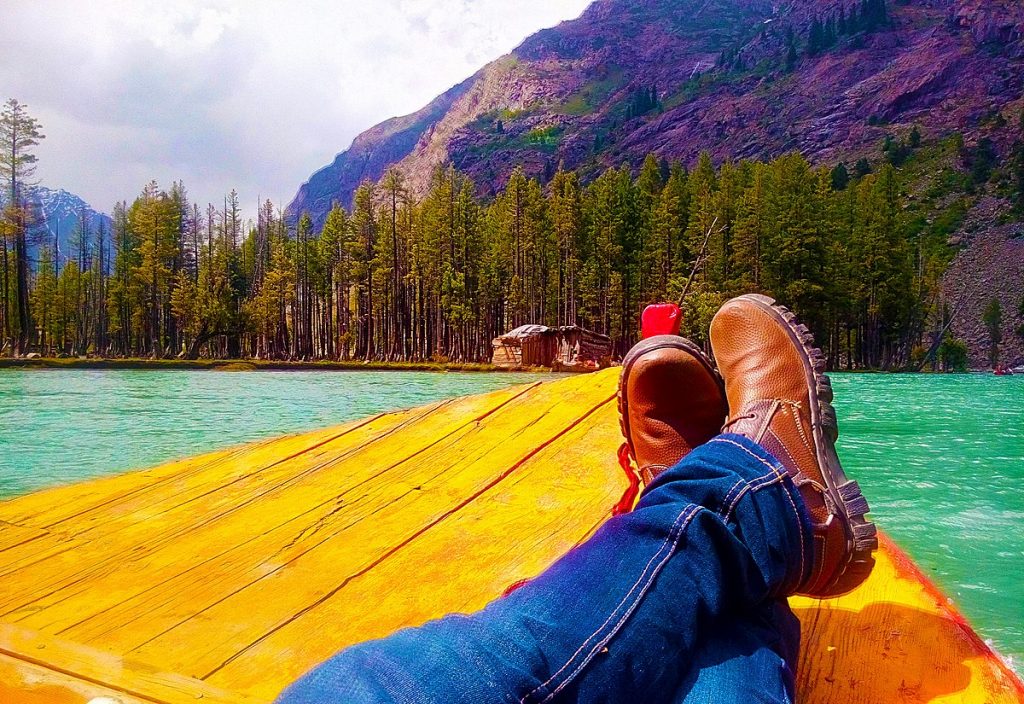The following is a chapter from Money, Sex, Power & Faith.
Order your copy in paperback or for Kindle!
“Those in power have made it so we have to pay simply to exist on the planet. We have to pay for a place to sleep, and we have to pay for food. If we don’t, people with guns come and force us to pay. That’s violent.” – Derrick Jensen, Endgame, Vol. 1: The Problem of Civilization
The irony of the Industrial Revolution is that it was often sold as the path toward the life of leisure. The methodology of machinery meant that we would create labor-saving devices that would afford us the ability to not work so hard. However, exactly the opposite has happened, and where much of the work that we were once trying to escape was geared toward meeting the basic needs of food, water, and shelter, much of the work that is performed today in order to attain money is largely involved with establishing extravagances and superfluous materialism.

As Charles Eisenstein states in The Ascent of Humanity, “In the United States, leisure time did seem to be increasing throughout the 20th century until about 1973, when it began a gradual, sustained decline. Most researchers agree that leisure time has decreased in the thirty years since then: we are spending more time working, more time commuting, more time running errands, more time meeting the obligations of life. The computer, trumpeted as the final key technology that would do for the drudgery of mental labor what machines had (supposedly) done for physical labor, has brought about the opposite: more time spent in offices, at desks, at keyboards. By now it is apparent that the computer has not eliminated the drudgery of office work, any more than the steam engine eliminated the ordeal of physical labor.”
While our culture demands that people work in order to pay for their survival, we’re not so demanding about what type of work people do. In the mad rush to pay off our indebtedness to the wealthy for allowing us to live here, we’ve developed a multitude of jobs that, although they offer little for the greater good of humanity and are often quite detrimental to communities and the planet, because the end result is the movement of money, we have come to accept it as necessary for the health of our economy. This has unfortunately resulted in a slough of cheaply made, disposable, often toxic yet trivial products, and the exhortation of billion dollar industries in activities such as pornography, prostitution, drugs, and organized crime. Nevertheless, as long as people are working for money, we find some sort of contentment that things are working out nicely.
For most of us in the lower and middle classes, we believe that others need to work because we have to work. While there are some who are proactive enough to find something that they love to do and get people to pay them for it, the majority of us are not given that luxury, finding ourselves in Tyler Durden’s stated dilemma of “working at jobs we hate to buy shit we don’t need.” Due to our state of indentured servitude, we can’t stand to see people not working, and for those who can’t find it, due to either the fallibility of our manufactured society or their personal limitations of addiction, mental illness, physical illness, or downright apathy, some of us are loathe to enable them by offering them charity that has not been accordingly offered to us.
And so, while 14.8% of Americans live in poverty, according to the 2014 Census, one in ten of whom work full-time jobs, according to the Huffington Post, and half a million Americans suffer from homelessness, almost a quarter of whom are military veterans who have worked harder than many of us will ever experience, we continue on in our blind devotion to industrialism and a work ethic which still leaves us wanting. Yet to give up this system of ingrained acquiescence to the mandates of money begs the question as to how we will get people to work if we don’t hold this societal indebtedness over their heads.
Yet truthfully, humans enjoy work. We actually love the sense of purpose that a job well done provides beyond the economic demands required of us. For anyone who has worked honestly and with passion, we know that the true value of the work is greater than the money we are paid. As Viktor E. Frankl wrote in Man’s Search for Meaning, “Everyone has his own specific vocation or mission in life; everyone must carry out a concrete assignment that demands fulfillment. Therein he cannot be replaced, nor can his life be repeated. Thus, everyone’s task is unique as is his specific opportunity to implement it.”
The fact that over 25% of Americans donate over 7.7 billion hours a year in volunteer services is a testament to the fact that people actually do enjoy participation in life and serving others. I would go so far as to say that if the population were not forced to work so many hours in jobs that do not make them feel purposeful, they would be much more likely to engage in volunteerism even more.
If we are to move beyond our current system of indentured servitude, wasted resources, and unbridled consumerism for the sake of mere money, “We must do away with the absolutely specious notion that everybody has to earn a living,” as Buckminster Fuller said. “It is a fact today that one in ten thousand of us can make a technological breakthrough capable of supporting all the rest. The youth of today are absolutely right in recognizing this nonsense of earning a living. We keep inventing jobs because of this false idea that everybody has to be employed at some kind of drudgery because, according to Malthusian-Darwinian theory, he must justify his right to exist. So we have inspectors of inspectors and people making instruments for inspectors to inspect inspectors. The true business of people should be to go back to school and think about whatever it was they were thinking about before somebody came along and told them they had to earn a living.”
Now it is true that if we were to give people more opportunities to work toward more purposeful endeavors than those that industrialism demands, we will most likely find ourselves with shortages of Spongebob Squarepants beach balls, leaky plastic squirt-guns, and a majority of the products that currently fill our landfills. And we may have to deal with having fewer than fifty different varieties of Oreo cookies, as we have seen in the last few years. However, we would also most likely see a greater assortment of organic foods being grown in community gardens and backyards, expanded research on more sustainable practices, and a renewed sense of community resilience as people reclaim their time and energy, diverting it into activities that matter more to them than doing whatever they have to do in order to make a buck.
As economist Ha-Joon Chang wrote in Economics: The User’s Guide, “Even in the richer countries, what happens at work can make people fulfilled, bored, valued or stressed. At the deepest level work shapes who we are.”
What if our resources of time and labor were viewed as more than just capital from which we can derive monetary movement? What if, instead of an economy based on money, we looked to an economy based on the resources we don’t have to manufacture?
Unfortunately, as Chong points out, economics, “is not – and can never be – a science; there are no objective truths in economics that can be established independently of political, and frequently moral, judgements. Therefore, when faced with an economic argument, you must ask the age-old question ‘Cui bono?’ (Who benefits?), first made famous by the Roman statesman and orator Marcus Tullius Cicero.”
Were we to view economics as a system of regulating actual resources instead of merely the money we manufacture in order to increase the continued disassociation of the wealthy, we may have a chance of utilizing the soft science in a way that would meet the needs of the entirety of the population. However, as we have used it so inadequately, we find ourselves in the throes of imbalance, where our resources are largely squandered in a perpetual game of sleight of hand. Should the people of Earth engage their abilities to sincerely measure economics as the “rules of the house” established by the Greek oikonomia, from which we get the word “economy”, then perhaps we can save ourselves from this seemingly unyielding instability. Based on the human ingenuity that has gotten us this far, it is possible to establish a more adequate means of meeting human needs while simultaneously serving as the caretakers of the planet we have so greatly ignored due to our obsession with money.
In The Ecology of Commerce, Paul Hawken discusses the difference between oikonomia and chrematistics, which has been the hailing practice of industrial society. “It (chrematistics) can be defined as the branch of political economy relating to the manipulation of property and wealth so as to maximize short-term monetary exchange value to the owner. Oikonomia, by contrast, is the management of the household so as to increase its value to all members of the household over the long run. If we expand the scope of household to include the larger community of the land, of shared values, resources, biomes, institutions, language, and history, then we have a good definition of ‘economics for community.”
It may be no coincidence that the Greeks, who coined the phrase for our estimation of value in the world around us, were among the first to have their economy crash and revert to the simplicity of barter and local currencies. Although their recent transition into a more meager version of economics was largely forced by crushing debt, the struggles to find balance in their new operating system need not be so catastrophic for the rest of the watching world. It may very well be, as with all trailblazers, that the suffering endured by Greece during their involuntary emancipation from the fallibility of the world’s monetary economy may just be the sacrifice that the rest of us have been longing for as we seek the way to our own freedom.
Economics, in its most perfect sense, should not be the means through which disparity is cultivated, as it is in our modern commodity-based world view and the competition it thrives upon. If we are to look at the breadth of humanity as the family that it is, economics should be used to ensure that the needs of the entirety of humanity and the rest of the planet are met, instead of being used as a constant call toward competition, culminating in the relentless outcome of “winners and losers” and “haves and have-nots”. The “rules of the house”, the true oikonomia that will provide for the human race, cannot be sustainably based on endless gladatorialism and the misconstrued Darwinian concept of “survival of the fittest”, for the truly fittest among us are not the strongest, but the most adaptable. It will ultimately be our ability to change from that which no longer serves us that will be our greatest wealth.
Our method of looking at the world through the eyes of duality has culminated in the theoretical competition between capitalism and communism/socialism. While capitalism focuses solely on the individual, and the capital each individual can accrue for themselves (whether that individual be a human or a corporation), it largely ignores the fact that although we are each individuals, we are also part of a greater community and society at large. Moving forward, it would do us well to realize that there is no one single “ism” that will meet all of our needs, but that we need a more pragmatic approach which recognizes the greater abundance of a broader world view.
As Dr. Martin Luther King, Jr. wrote in his book Where Do We Go From Here?, “Communism forgets that life is individual. Capitalism forgets that life is social, and the kingdom of brotherhood is found neither in the thesis of communism nor the antithesis of capitalism but in a higher synthesis. It is found in a higher synthesis that combines the truth of both.”
As the cowardice of capitalism has forced us to shield our eyes to the reality that we are part of community by cowering in the fear of communism, and tries to negate the fact that we are a society by eschewing the practice of socialism, we have still integrated their practices out of necessity. The ridiculous “every man is an island” notion that has awarded us the impossible task of “pulling ourselves up by our own bootstraps” has a grand majority of us attempting to live up to the most fantastical ideals of separation possible as we embrace the uttermost insanity of our egos. If we can open our eyes to the realities of community and society beyond the “isms” we’ve been trained to fear, we may be able to realize that we are entitled to more than we’ve been allowed to believe by the charlatans who’ve been calling the shots.
By looking at the needs established in Abraham Maslow’s hierarchy, we are able to get a greater sense of what is facing humanity, how we can utilize our resources in order to meet those needs, and assist our fellow brothers and sisters in accessing the abundance that is our birthright. Unlike his contemporaries, who studied pathologies and the nature of mental disease, Maslow’s focus was on those who were more successful at navigating the waters of good mental health and managed to create happy and fulfilling lives for themselves. In creating avenues through which a greater percentage of the population can meet their needs in order to have a more vibrant and fulfilled civilization, we would be wise to follow the paths of those who have excelled rather than mire ourselves in the pitfalls of failure.
Maslow’s original hierarchy has five tiers addressing the needs that humans encounter in their experience of Western civilization. First are the physiological needs of breathing, food, water, sex, sleep, homeostasis, and excretion. As the commodity world view began to value food as only a product, a house for its investment potential more than its potential as a home, and healthcare as a for-profit industry, many of these needs are daily struggles which ensure that an increasing number of our citizens will not be able to fulfill their potential as human beings.
For those that do find food to eat and a place to sleep and use the bathroom, their struggles are further agitated as they strive for the needs of safety, such as security of body, of employment, of resources, of morality, of the family, of health, and of prosperity. Given that the vast majority of Americans are a paycheck away from having these securities stripped from them, since morality is still being legislated, and disease itself has become a commodity, a huge portion of the population devotes much of their attention to only meeting their basic needs. Again, due to the societal mismanagement of our resources and the inordinate disparity between classes, our standard operating procedures force us to dismiss an immense contribution to our economic viability. Because so many are devoted to meet needs which are readily accessible, yet held just out of reach by the complexity of the financial system and the ruse of its fundamental necessity, our economy is a shadow of what it could be, valuing scarcity over abundance.
For those of us who manage to meet our physiological and safety needs, we can direct our attention toward addressing our belongingness and love needs, cultivating our friendships, family, and sexual intimacy. Finding a place and a people to which we belong, we are able to address our esteem needs, nurturing our self-image, bolstering our confidence, and gaining a sense of achievement, thereby being respectful of others and garnering respect from others in kind. With healthy esteem, we are able to focus on our self-actualization to cultivate our own morality, creativity, spontaneity, problem-solving ability, and understanding of our place in the world.
If we, as a society, continue to operate in a way in which the majority of the population must struggle to meet the most basic of needs so that only a few can live in opulence, how can we expect them to find belonging, to feel any sense of confidence or achievement, or to orchestrate their own self-actualization? In moving forward together and realizing that we are all one human race headed in the same direction, should we actualize our unity by ensuring that our resources are managed in a way that will meet our collective needs, we will be able to grow and evolve together. Should we ignore our collective needs in deference to the game of competition, domination, and selfishness that has manufactured them, we will continue to be engulfed in unmet needs.
Order your copy of Money, Sex, Power & Faith today!


